Man Refuses To Pay For The 4th Round of Puppy Shots For Soon-To-Be Ex-Wife's Dog, Leaving Her Furious
Divorce usually involves many challenging decisions, including how to divide all the property acquired during the marriage. Deciding who gets what when a relationship ends can be difficult, and there is no one-size-fits-all guide on how to do it.
One Reddit user, Artistic_Slip_3933, is getting divorced from his wife and has taken the AITA subreddit to ask whether it would be wrong of him not to pay for puppy shots when the dog would ultimately go to his wife.
In a post on the AITA subreddit, Artistic_Slip_3933 explained that his wife bought the dog and paid for the most recent vet visit. However, they agreed that he would cover all the bills while she covered the dog's food.
Artistic_Slip_3933 has been caring for the dog since they got her in April because his wife was rarely home due to her busy work schedule. As a result, the dog bonded with Artistic_Slip_3933.
However, when his wife asked for a divorce, she insisted on taking the dog and giving it to her mother. Although she hasn't made any effort to come and get the dog since she moved out, she recently sent a message to Artistic_Slip_3933 asking him to take the dog for the puppy shots.
Artistic_Slip_3933 knows puppy shots are necessary but is reluctant to pay for them because his wife would take the dog and not reimburse him for the money. He has asked his wife whether he could buy the dog from her, and she demanded $1,000, although she spent roughly $880 on the dog.
Artistic_Slip_3933 doesn't mind paying the $1,000, but she has refused to reply to him since he asked whether he should send the payment to her. Here is what the AITA community thinks Artistic_Slip_3933 should do.
This couple is getting a divorce.
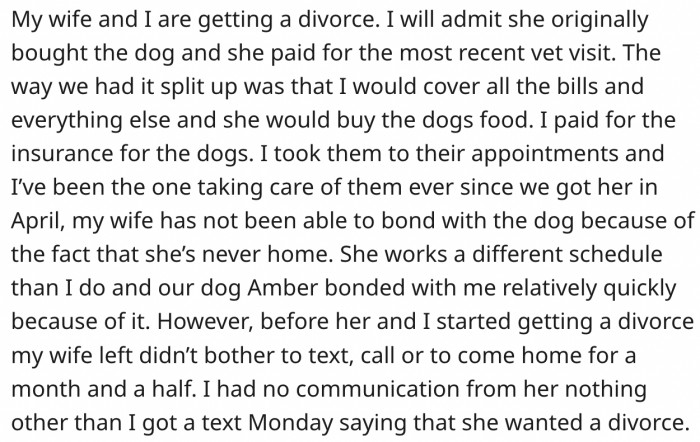
Should he pay for the shots?
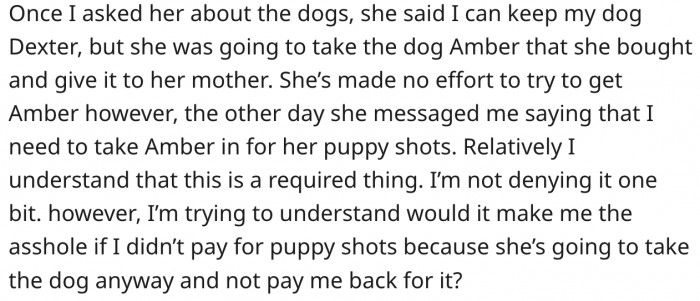
He knows she won't pay him back. Reddit responds.

The Emotional Weight of Pet Ownership
The decision about whether to pay for a pet’s medical expenses can evoke intense emotions, particularly in the context of a failing relationship. Research in psychology journals suggests that pet ownership often reflects deeper emotional bonds and responsibilities that people may feel compelled to fulfill, even when relationships deteriorate.
This situation illustrates how financial decisions regarding pets can become entangled with feelings of love, guilt, and obligation.
The Psychology of Responsibility and Shared Ownership
In relationships, especially those that involve shared responsibilities like pet ownership, the concept of accountability can become a contentious issue.
Dr. Karen R. Hurst, a family psychologist, emphasizes that differing perceptions of responsibility can lead to conflict when expectations are not aligned.
In this case, the man's refusal to pay for the puppy shots may reflect deeper issues regarding his commitment to the relationship and shared responsibilities.
1. He should do everything possible to keep the dog since they bonded.

2. She only wants the dog to hurt him.
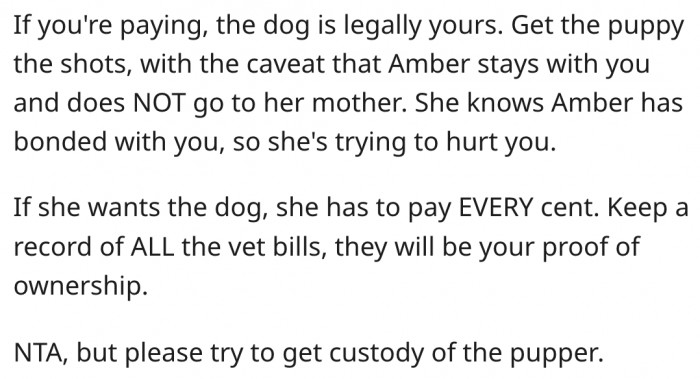
3. He should demand a refund for all the money he spent on the dog.
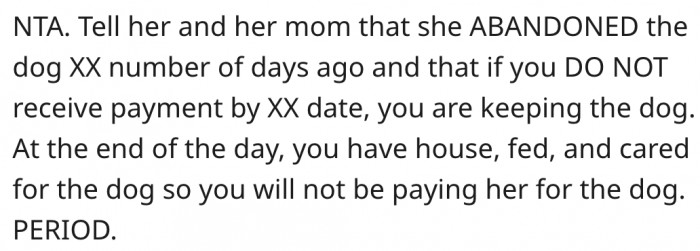
In relationships, financial disagreements can often signal deeper issues of trust and commitment. A study published in the Journal of Family Psychology highlights that couples often argue over financial matters as a proxy for unresolved emotional issues. This underscores the importance of transparent communication about financial responsibilities in romantic partnerships.
Understanding the underlying emotional dynamics can help partners navigate these discussions more effectively.
Research indicates that perceived inequities in relationships can lead to dissatisfaction and resentment. According to Dr. Esther Perel, a renowned couples therapist, "When one partner feels they are carrying a heavier load, it can create a significant emotional imbalance, leading to conflict and distress." Furthermore, Dr. Eli Finkel, a relationship researcher, notes that "Inequity in shared responsibilities often results in increased stress and emotional turmoil, which can jeopardize the relationship's foundation." These insights underscore the importance of equitable partnerships in maintaining relationship satisfaction.
4. It is his dog.

5. She is wicked for wanting to take the dog away.
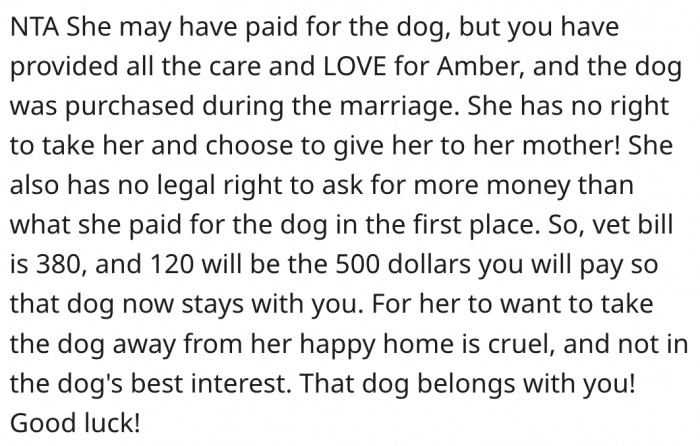
6. The dog is meant to choose who to go with between him and his wife.

Navigating Conflict in Relationships
Conflict resolution is critical in any relationship, particularly when it comes to shared responsibilities like pet care. Research indicates that effective conflict resolution strategies can significantly improve relationship satisfaction. Couples who practice open communication and collaborative problem-solving tend to experience less resentment and more satisfaction in their partnerships.
In this case, having candid conversations about expectations around the dog's care and associated costs could help alleviate tension.
The Emotional Impact of Pet Ownership Decisions
Decisions regarding pet care often carry significant emotional weight, as pets are viewed as family members by many.
Psychological studies show that the emotional bond between humans and their pets can complicate financial decisions related to their care.
Dr. Theresa L. Smith, an animal behaviorist, notes that these emotional attachments can lead to conflict when financial responsibilities are perceived as unbalanced.
7. He should involve a lawyer to see whether he can keep the dog legally.

8. He shouldn't let the dog suffer preventable diseases because he and his wife are having issues.
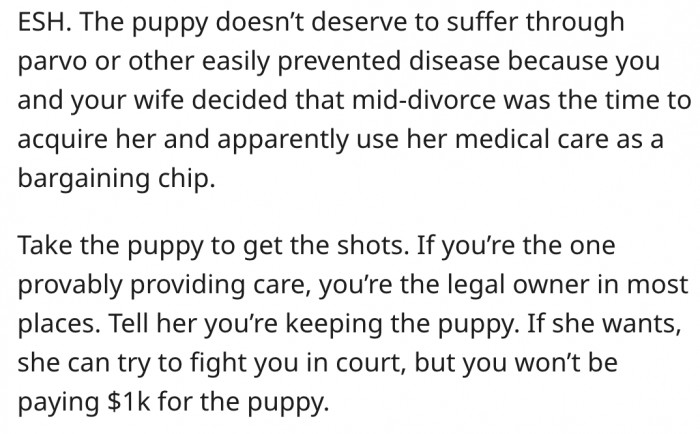
9. He should have gotten the dog puppy shots long ago. The dog needs something else now.

Additionally, exploring the concept of shared emotional labor can provide insights into this conflict. Emotional labor refers to the process of managing feelings and expressions to fulfill the emotional requirements of a job or relationship. In the context of pet ownership, both partners might feel they bear different burdens concerning care, leading to frustration.
Recognizing and discussing these emotional labor dynamics can foster a more equitable distribution of responsibilities.
To address financial disagreements, experts suggest open and honest communication about expectations and commitments.
Research in the Journal of Family Psychology indicates that couples who engage in proactive discussions about finances often report higher relationship satisfaction.
Addressing these issues early can prevent misunderstandings and resentment from building up over time.
10. The dog is his because his wife abandoned it.

11. He shouldn't punish the dog for an offense it did not commit.
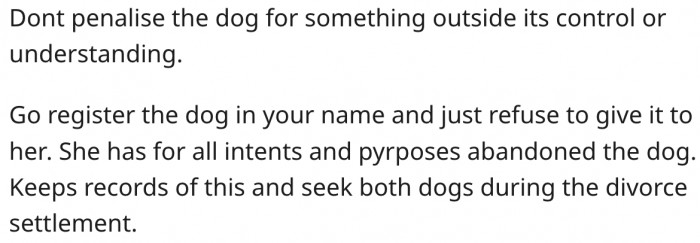
12. He should get a lawyer and fight it out.

The Importance of Compassionate Communication
When addressing disagreements, employing compassionate communication techniques can lead to more productive discussions. Research in Communication Studies shows that using 'I' statements instead of accusatory language can help reduce defensiveness and promote understanding.
For instance, saying 'I feel overwhelmed by the costs of the puppy shots' can open up a dialogue without placing blame, thus fostering a more collaborative approach to problem-solving.
Strategies for Healthy Financial Conversations
When addressing financial responsibilities, it’s essential to approach the conversation with empathy and understanding.
Experts recommend using “I” statements to express feelings without assigning blame, which can facilitate a more constructive dialogue.
Additionally, setting up a budget for pet care can help clarify financial responsibilities and ensure both parties feel comfortable with the arrangement.
13. He can get legal custody of the dog if he involves a lawyer in the dispute.

What Do You Think?
Divorces are complicated and can become messy, especially when children and pets are involved. It only takes one party to be unreasonable and manipulative for things to go south when dividing all the property acquired during the marriage.
Sadly, the child or pet's best interest is often not considered. In this case, what do you think is the right way forward?
Psychological Analysis
This situation underscores the complexities of shared responsibilities in relationships, particularly when it comes to caring for pets.
Our in-house psychologist notes that aligning expectations and fostering open communication are crucial to resolving conflicts related to shared ownership.
Analysis generated by AI
Analysis & Alternative Approaches
Ultimately, navigating financial responsibilities in relationships requires open communication and empathy.
As Dr. William Doherty, family therapist, states, "Effective communication about finances can help couples avoid conflict and build trust." Addressing issues proactively can strengthen relationships and foster shared understanding, as emphasized by Michelle Singletary, financial columnist, who notes, "When partners openly discuss their financial goals and responsibilities, they create a stronger bond."
Ultimately, building a foundation of mutual respect and understanding is essential for resolving such conflicts. Couples should strive to engage in regular check-ins about shared responsibilities, which can help prevent misunderstandings from escalating into larger disagreements. Developing these habits can enhance both emotional intimacy and partnership stability.
In this case, encouraging an open dialogue about feelings towards the dog can foster a stronger connection and alleviate stress.
Analysis & Alternative Approaches
In summary, resolving conflicts surrounding shared responsibilities requires empathy, communication, and mutual understanding. Research supports the importance of addressing emotional dynamics and financial responsibilities in relationships.
By fostering open dialogue and collaboration, couples can navigate these challenges successfully, enhancing their emotional connection and relationship satisfaction.



